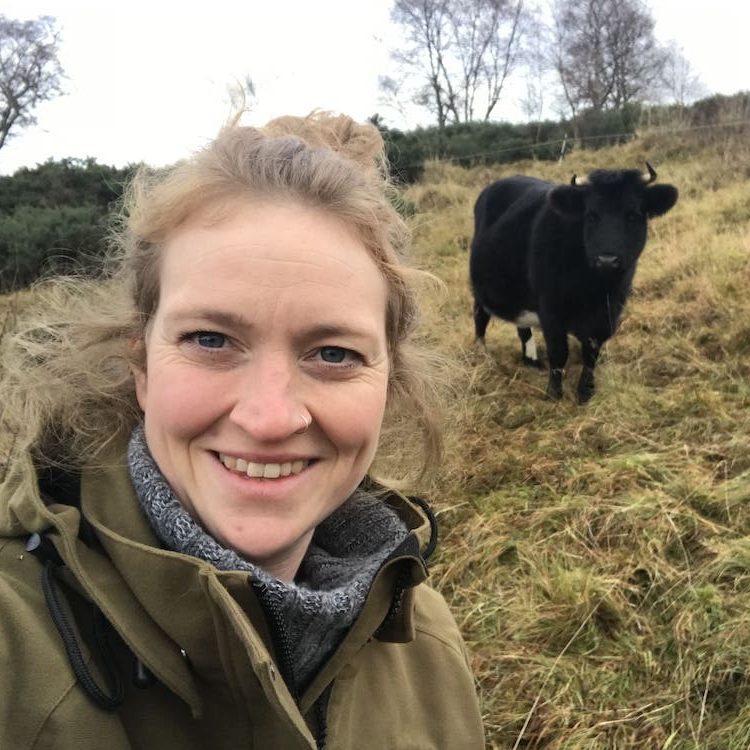This International Women’s Day, we wanted to shine a light on some of the inspirational women* within the Landworkers’ Alliance, to hear about their journey to where they are now, and their vision for the years ahead. Meet six remarkable landworkers who are pioneering the transition to better food and land-use systems…
(*the term women includes all who self define as women)
NIKKI YOXALL, GRAMPIAN GRAZIERS
One of the nine ambassadors for the Soil Association Scotland, Nikki and her husband James run Grampian Graziers, in Aberdeenshire. Combined with a thriving agroforestry system, their small herd of pasture-fed, native cattle are helping restore the ecological balance of their environment, while providing high-quality, nutritious beef for the wider community.
Follow her: https://www.instagram.com/grampiangraziers
Can you recommend a book/film/story that has inspired you as a landworker?
For the Love of Soil by Nicole Masters is a brilliant book that has really inspired me to think differently about soil ecology. I was also given One Woman Farm by Jenna Woginrich for my birthday, which beautifully captures so many of the seasonal shifts and moods I experience working on the land.
How does being a woman strengthen you as a farmer, and what can a more gender diverse farming community bring to the table?
I consider community and peer support as key aspects of my farming practice, with an innate desire to nourish others. I’m not sure if that is just because I am a woman, but I have noticed that often women contribute solutions to challenges in the sector that are more community or support focused, which can bring an invaluable sense of collective care and assistance.
What does your vision of a radical, intersectional food and farming movement look like?
Local, seasonal foodways, that vary geographically and temporally. Vibrant communities of producers and growers working collaboratively to serve their local area with a short supply chain. Genuine celebration of food and farming to reflect seasonality and reduction in size and power of supermarkets, with massive taxation of corporations enabling extractive agriculture to fund agroecological and regenerative farmers.
SINEAD FENTON, AWESIDE FARM
Sinead grows organic vegetables, herbs and edible flowers with her partner Adam at Aweside Farm, their 4.5 acre small-holding in East Sussex. Sinead is from London and has a background in software and food policy, but was introduced to the world of horticulture through volunteering at a community allotment in 2017 – a few years later, the pair decided to leave London, to set up their own farm, where they are now.
Follow her: https://www.instagram.com/awesidefarm
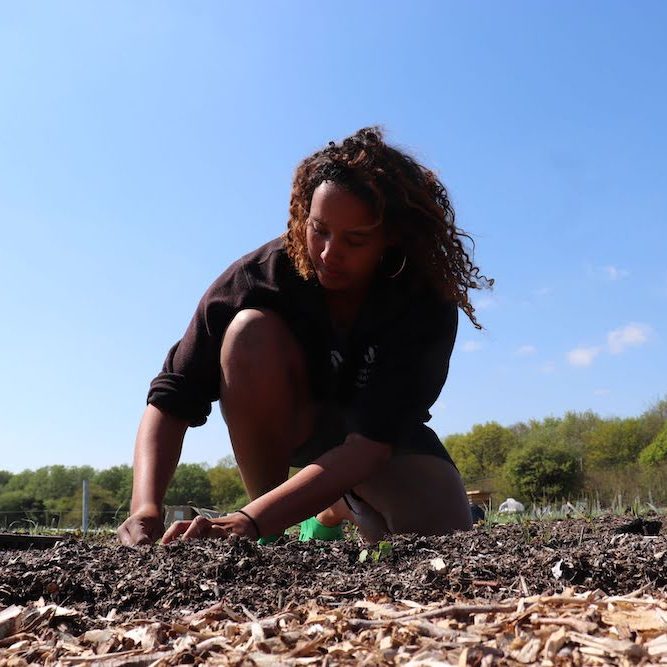
What do you most enjoy about working in farming?
Becoming fully immersed in natural systems has been a really incredible experience. On this patch of land, I’ve built up a connection I never expected would go so deep, so healing and transformative. I came into growing and farming from a need to connect with ‘something’ during a dark time in my life, and that ‘something’ I became drawn too was the natural world, through food, flowers and wildlife. I realised how far detached I’d become from that world. This work makes me want to see what tomorrow brings – more than just enjoyment, but a sense of being held which is so comforting.
How does being a woman strengthen you as a farmer, and what can a more gender diverse farming community bring to the table?
A diversity of thought and experience is always a good thing, it is key to making communities stronger. Without celebrating the different ways people can see the world, we get stuck. It does no one any good to see only one section of society represented, heard and making decisions. It’s the biggest injustice in our world, not inviting more diversity from all sections of society into our spaces to be heard and lead.
What does your vision of a radical, intersectional food and farming movement look like?
One where all sections of society are represented, have a voice, are shaping and co-creating our food and land-based systems. For too long so many voices have been marginalised. To celebrate the true diversity of our natural world, we have to embrace its people too – that’s what true regeneration, justice and agroecology needs. Not doing so means this movement and spaces stays stuck, never embracing new experience and ideas, but perpetuating much of the same.
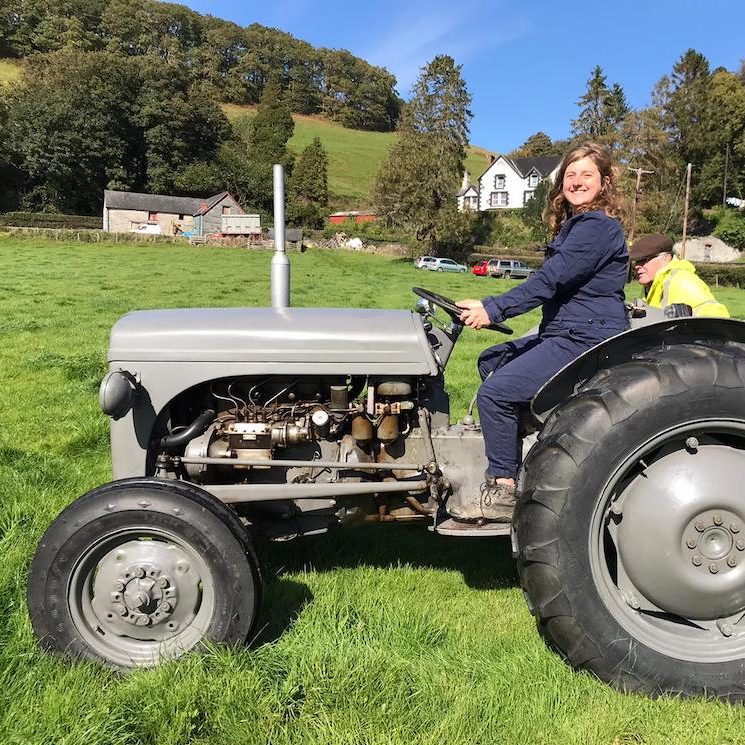
KATIE HASTINGS, MACH MAETHLON
Katie is a co-founder of Mach Maethlon, a community food organisation in West Wales, which runs horticultural training, growing workshops, a veg box scheme, food hub and Land Army. She works with seeds as the Wales Coordinator for the UK Seed Sovereignty Programme, and is also ‘patchwork farming’ wheat, potatoes and vegetables on local farms in Mid Wales.
Follow her: https://www.instagram.com/the_edible_gardener
What would you say are the main challenges for women in UK agriculture, and how are these being navigated?
I’ve experienced discrimination at work in the everyday ways that are common to a lot of women. I’ve had men walk into polytunnels full of crops I have grown and tell me how I should be growing them. I’ve been mansplained to in public talks and had male volunteers actively try to take over tasks I am leading. I’ve had people express visible shock that I can use tools. Each one of these things is small on its own, but it can add up.
But for each sexist in the field there are 50 other respectful people who treat me as the capable three-dimensional person I am. The local farming community here in Mid Wales is very respectful and supportive of my work. The regenerative farming movement is full of strong female role models. In my seed work I meet a plethora of different kinds of farmers as equals. I am very privileged to meet so little discrimination. I think it would be a different story if I wasn’t white and perceived to be middle class.
How has the pandemic affected your work? Do you think it has triggered any long-term shifts?
In the seed world we suddenly saw a rush of people thinking about where their food starts. Our seed trainings were over-subscribed. Seed sales went up 600% in the UK in 2020! It felt like the world suddenly stripped back to what was ‘essential’ and important. Food production and seed diversity are being valued like never before.
We tend to think of farming as a male-dominated industry, but there are more women in agriculture globally than there are men. Is there anything you have learnt from indigenous practices or philosophies elsewhere, and how has this shaped your own approach to farming?
We need a wider variation of cultural narratives around seed! In a lot of cultures, women are the seed keepers. They ensure crop diversity is cared for, passed down and protected. This is often sacred work which cannot have a monetary value put on it. I sometimes try to step out of my narrow thinking around seeds and see them more as vessels for stories, ancestral lines and future possibilities.
In the Welsh culture, it’s interesting to hear from older women about the foods they have cooked. This often unlocks secrets to the foods that were grown across our landscapes and how these foods were integral to our lives.
KATE MOBBS-MORGAN, ROWAN WORKING HORSES
Based near Monmouth, South Wales, Kate specialises in low impact woodland and land management, using horses as a working tool. Originally trained in horticulture, she gradually developed an interest in working the land, and applying a traditional approach to contemporary forestry – which eventually led her to set up Rowan Working Horses.
Follow her: https://www.instagram.com/rowanworkinghorses
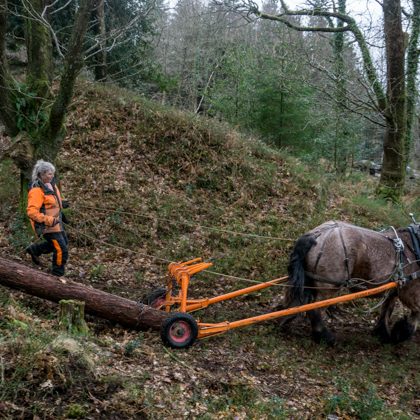
What do you most enjoy about working in forestry?
I love the working relationship that I have with my team of horses and the ever-changing environment that I work in. Each woodland I work is different and brings fresh challenges each time and new learning.
What would you say are the main challenges for women in UK forestry, and how are these being navigated?
In my line of work, it still comes as a surprise to more than a few that it’s a woman leading the contract. Navigating it comes from simply being the best I can and working alongside a strong team of open-minded folk supporting each other in an already challenging industry.
How does being a woman strengthen you as a landworker, and what can a more gender diverse forestry community bring to the table?
A more gender diverse community means you can play to each individual’s strengths and give everyone a role to play that brings everything together successfully at the end. You are certainly not going to be equal on all levels and that’s fine.
What would your advice be for women who want to work in forestry, but don’t know where to start?
This is a very hard life-style choice. It offers a quality of life as oppose to a quantity of money, but brings richness in other ways. I would advise joining the organisation that supports those working or wanting to work horses in forestry, meet like-minded people and volunteer with as many working in the industry as you can, to be sure it’s what you want to do. Then, if you get a passion for it, the rest will follow.
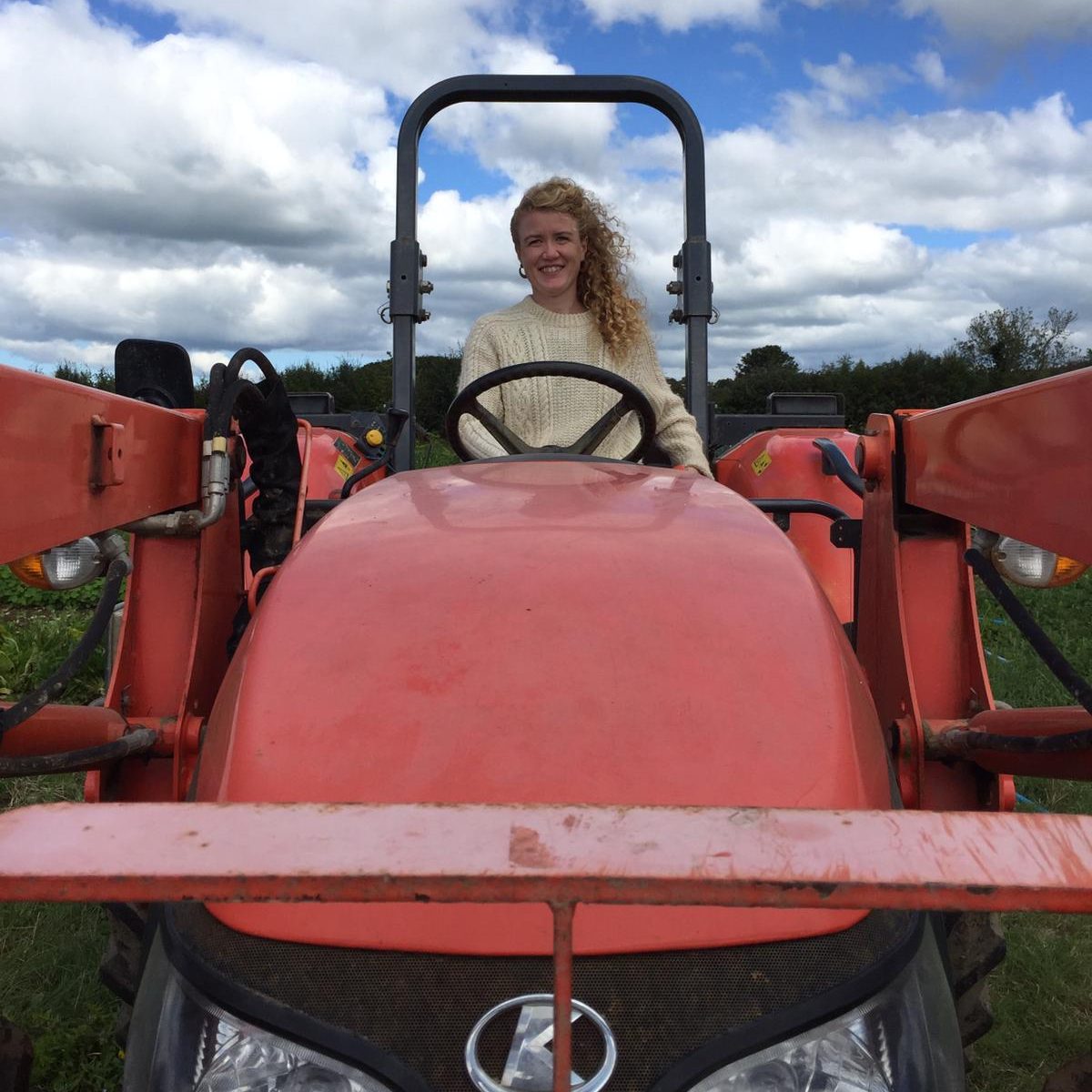
RITA OLDENBOURG, PITNEY FARM MARKET GARDEN
Rita runs a 3.5 acre organic market garden in South Somerset. Her journey into farming was primarily motivated by her drive to be proactive about climate change and address the social and political wrongs of our current food system – closely followed by a desperate need to work outdoors. Having grown up in a city, she took the urban route into farming: completing a PDC, getting a job with an urban community food growing project, reading as much as possible about farming, then a two season traineeship at Trill Farm Garden before she felt ready to set up a market garden with her partner.
Follow her: https://www.instagram.com/pitneyfarmmarketgarden
What would you say are the main challenges for women in UK agriculture, and how are these being navigated?
The typical image of a farmer in the UK is of a white, middle-aged man – it can be difficult for women to see farming as a viable choice of livelihood. I feel grateful that I have rarely felt discriminated against on my journey into farming, not more than the average woman on any other career path. The challenge is for anyone who is not a white middle-aged man in farming to be represented (LGBTQIA+, BIPOC) so that others can feel welcome, and for those thinking about entering farming to seek out these role models. The small-scale agriculture movement is making great progress with this.
How has the pandemic affected your work? Do you think it has triggered any long-term shifts?
We sell most of our produce through an on-site shop, which has never been busier. I think the pandemic will have raised awareness of the fragility of our food system and raised the profile of local producers for some of the population. However, I’m unsure as to whether it will have triggered any long-term shifts; if the pandemic is followed by a recession, we might lose as many as we gained. I think proper change within the food system has to come from changes in policy, which comes about through political pressure.
What would your advice be for women who want to start farming, but don’t know where to start?
Get experience on a commercial farm and stay for at least one season. It’s a practical job, the best way to learn is by doing it. Learning from someone else can save you a lot of mistakes and hard learning on your own, but try to take on as much responsibility as you can, as soon as you can. Farming has got to earn money if it is to be enjoyable, so business skills are needed! Get experience with machinery, even if you don’t want to use it much, its liberating to have the choice, and limiting to not have the experience. Follow the LWA, go to events, courses and talk to people, and subscribe to the Organic Growers Alliance’s periodical.
JO CARTWRIGHT, SWILLINGTON ORGANIC FARM
Jo runs Swillington Organic Farm, a family farm in the heart of Yorkshire. She has overseen a major transformation of the farm over the past 40 years – from expanding by 100s of acres, to becoming fully organic, and even establishing an on-site abattoir and butchery. The family now provides meat, veg and egg subscriptions directly from the farm, and is on a mission to reconnect local communities with their food.
Follow her: https://www.instagram.com/swillingtonfarm
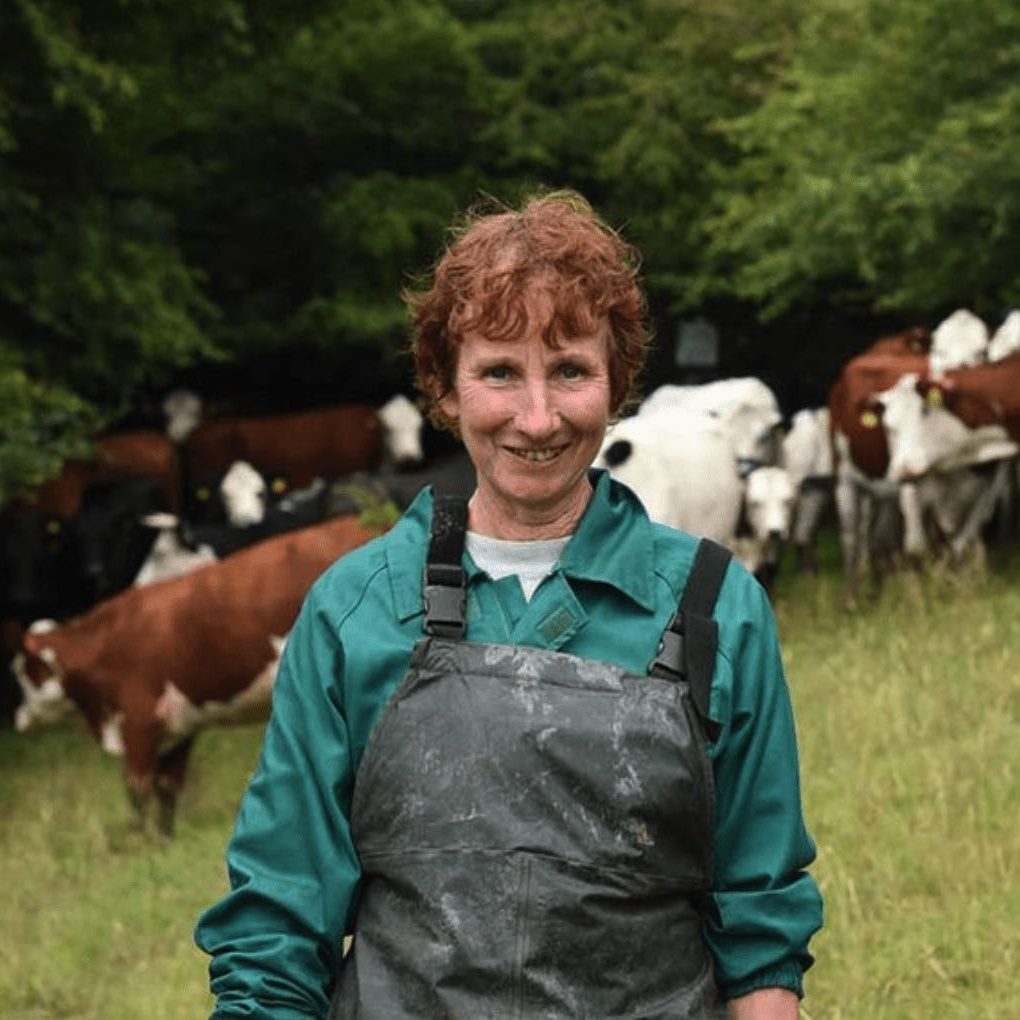
Photo Credit: Farmers Guardian
What do you most enjoy about working in farming?
Being outside, spending time with the livestock, also watching the wildlife on the farm – I have tried to improve the habitats we already have. It’s good to see the variety of wildlife increase. Working with livestock and improving the quality of the stock whilst helping to keep rare breeds going. We also have school visits and volunteers on the farm, it’s great to get others involved in food production.
Can you recommend a book/film/story that has inspired you as a landworker?
Recently I have enjoyed reading English Pastoral, by James Rebanks. It really explains well how my generation got farming to where it is now, the consequences we face, but with hope for the future.
What would your advice be for women who want to start farming, but don’t know where to start?
Try and get experience wherever you can, WWOOFing or volunteering with local projects/farms. Build up some savings, even if it means delaying your start into agriculture for a few years. I ended up doing various off-farm jobs at the same time as farming, as do many others, it would have been better to have done it the other way around.

